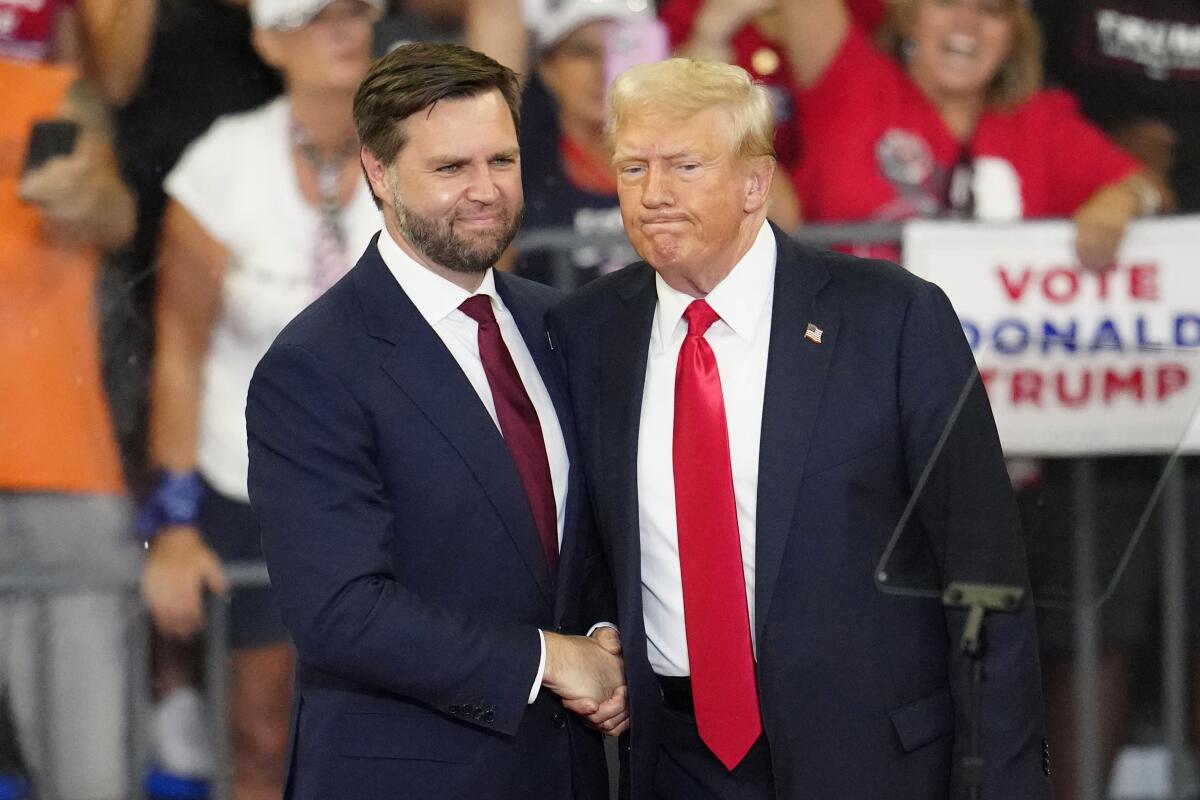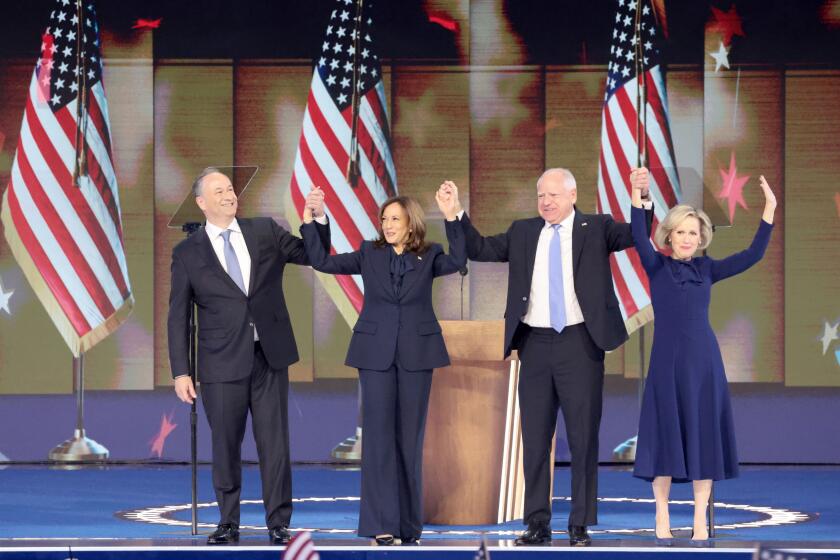With conventions over, a 10-week sprint to the White House begins

CHICAGO — Vice President Kamala Harris has enjoyed a monthlong burst of energy and optimism among Democrats who believe she is the party’s best chance of defeating former President Trump in November. But once the balloons dropped after Harris claimed her party’s nomination on Thursday, the reality set in that there is much work to be done in coming weeks in what is still expected to be a razor-thin contest.
“On Friday, I’m going to give you leave to take a three-hour nap. Eat a damn vegetable. And then sign up for shifts to get people registered to vote, to knock on doors, to hold events, to pull people in and make a seat at the table for people who are so busy they’re not consuming the information like we are,” Michigan Gov. Gretchen Whitmer told California delegates over breakfast. “We can do this. I’m more optimistic than ever. So lace up your Chucks, hit the doors, make room at the table, and let’s get it done.”
Polling shows that while Harris fares better than President Biden against Trump, it’s still an incredibly close race that will come down to a small number of voters in a handful of battleground states.
“She put Democrats back into the game to where it’s kind of a toss-up,” said John Anzalone, Biden’s lead pollster in 2020, at an event hosted by the University of Chicago Institute of Politics on Wednesday. “Step 2 is always the most difficult one.”
“We’ve seen it in every presidential campaign, and Step 2 usually happens post-conventions, post-Labor Day, when the bell rings,” he added. “That is like the battle for the slim universe of — you can call them anything you want: persuasion voters, swing voters, independent voters — and it’s pretty small. And that’s where each side [spends] a billion dollars.”
Harris has enjoyed a crush of positive news coverage and Democratic enthusiasm since Biden decided in late July to not seek reelection, her party quickly coalesced around her as their nominee, she named Minnesota Gov. Tim Walz as her running mate and then accepted the nomination in front of thousands of jubilant Democrats at their party’s convention in Chicago.
The Olympics also consumed significant media attention during this period, leading to Trump largely being relegated to the sidelines (aside from when he falsely claimed — in a room full of Black journalists — that Harris recently “happened to turn” Black).
The presidential contest between Kamala Harris and Donald Trump is essentially a toss-up at this point, according to pollsters. But Harris stakes out her vision for unifying the country while confronting her opponent.
But many Democrats acknowledge that this sunny period can’t continue unchecked until election day.
“At some point the honeymoon phase will be over,” said Democratic strategist Paul Mitchell, an alternate delegate who lives in Sacramento County. “What I think is really shocking is how good of a honeymoon phase that she’s had.”

There were fears among Democrats that their euphoria over the last several weeks could lead to complacency.
“There’s so much momentum,” said U.S. Transportation Secretary Pete Buttigieg in an interview. “The task now will be to bottle it up and use it to propel us through the next 10 or 11 weeks, through election day.”
The general election campaign traditionally starts after Labor Day. And there is a presidential debate scheduled on Sept. 10 at the National Constitution Center in Philadelphia. Walz and GOP vice presidential candidate JD Vance, a senator from Ohio, will face off Oct. 1 in New York City.
“I have jokingly said to a couple of people, ‘I sure wish the election were Tuesday,’” said Los Angeles County Supervisor Holly Mitchell. “I think we’ve been given our charge. … Don’t wait to be called. Show up.”
Indeed, a common thread among many of the convention’s most prominent speakers was how close the election would be, and the need to keep the foot on the gas pedal through Nov. 5.
“We only have 2½ months, y’all, to get this done. Only 11 weeks to make sure every single person we know is registered and has a voting plan,” former First Lady Michelle Obama told delegates Tuesday. “So we cannot afford for anyone, anyone, anyone, America, to sit on their hands and wait to be called. ... You know what you need to do.”
Tim Walz delivered an acceptance speech that checked all the political boxes. But he didn’t show much of the joy that he brought to the Democratic presidential ticket.
Obama exhorted them to “do something.”
“Because, y’all, this election is gonna be close. In some states, just a handful — listen to me — a handful of votes in every precinct could decide the winner,” she said. “So we need to vote in numbers that erase any doubt. We need to overwhelm any effort to suppress us. Our fate is in our hands.”
Former Secretary of State Hillary Clinton, who won the popular vote but lost the electoral vote to Trump in 2016, urged delegates to act.
“We need to work harder than we ever have. We need to beat back the dangers that Trump and his allies pose to the rule of law and our way of life,” she said Monday. “Don’t get distracted or complacent. Talk to your friends and neighbors. Volunteer. Be proud champions for the truth and for the country that we all love.”

Clinton’s surprise loss was repeatedly invoked as a warning against being overly confident.
“We learned the hard way in 2016 that you not only have to win the popular vote, you have to win the electoral vote, and you can’t take any of it for granted,” former California Sen. Barbara Boxer told reporters. “So we learned some hard, hard lessons, and we paid the price with Donald Trump for four years, a nightmare.”
Boxer said she has been to every Democratic National Convention except one since the 1980s and said only the 2008 gathering when President Obama was nominated had a similar level of “organic excitement.” But this year is extra-charged by the fear of Trump once again sitting behind the Resolute Desk in the Oval Office.
Former President Obama warned Democrats about the stakes.
“Now, the torch has been passed. Now, it is up to all of us to fight for the America we believe in,” he said. “And make no mistake, it will be a fight. For all the incredible energy we’ve been able to generate over the last few weeks, for all the rallies and the memes, this will still be a tight race in a closely divided country.”
Times staff writer Noah Bierman in Chicago contributed to this report.
More to Read
Get the L.A. Times Politics newsletter
Deeply reported insights into legislation, politics and policy from Sacramento, Washington and beyond. In your inbox three times per week.
You may occasionally receive promotional content from the Los Angeles Times.













